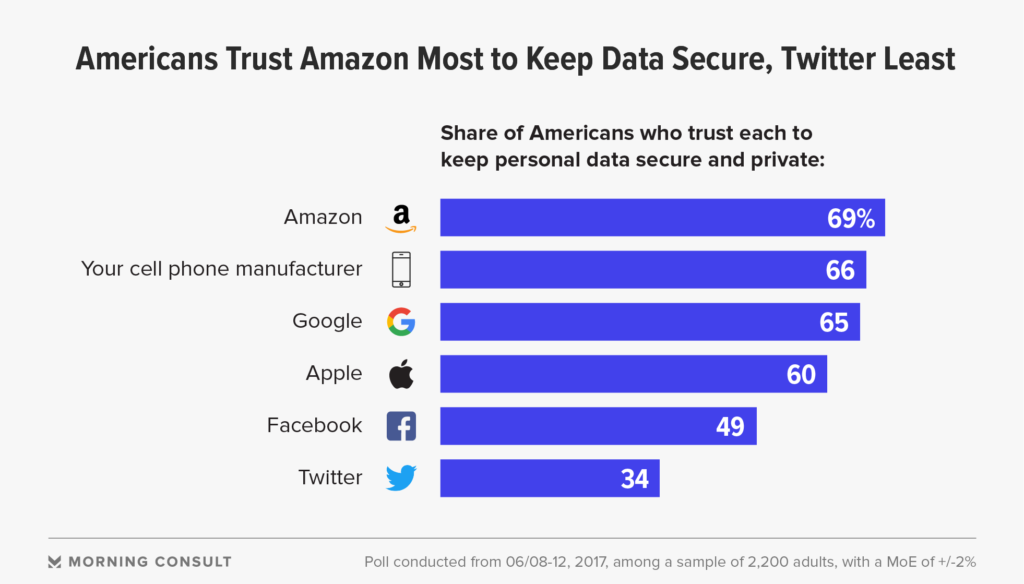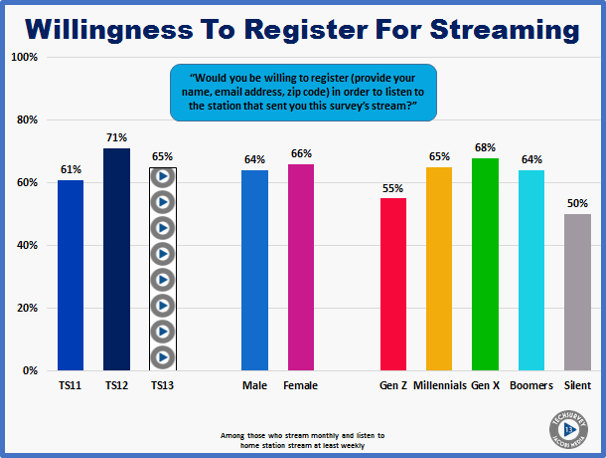
These days, we hear a lot about authenticity. We read articles that young people, in particular, have refined, sensitive “B.S. Detectors,” always willing to call out advertisers, marketers, and brands that cross the line.
In an increasingly transparent world, the notion of trust becomes especially important to marketers. We live in an age where elections are being hacked, companies are held hostage just to regain control of their emails, and every week brings us a new story of data being compromised.
So now more than ever, the trust bridge that brands build with their consumers – whether you’re Target, Apple, or a radio company – becomes especially important. A recent Morning Consult survey of 2,200 American adults reveals the most-trusted companies when it comes keeping personal data secure and private.
Perhaps it’s not a surprise that Amazon is first in that all-important clubhouse, a company that relies on trust in order to support their multi-billion dollar e-commerce machine.
 Google and Apple aren’t far behind, while social media sites are further back. Twitter looks especially rugged, trusted by only one-third of respondents.
Google and Apple aren’t far behind, while social media sites are further back. Twitter looks especially rugged, trusted by only one-third of respondents.
As more and more of us conduct transactions online, giving up credit card and personal information in order to do business and engage with companies, the ability for brands to instill that sense of trust translates directly to their ability to generate scalable revenues and profits. A trust implosion caused by a well-publicized data disaster can sink a company, and its ability to connect with its core consumers.
And so it is in radio. Most stations aggregate email databases, but many do not treat this asset like the jewel it is. For most advertisers and marketers, ratings – reach, frequency, and time-spent listening – may be useful metrics, but lack the accountability needed to make strategic decisions. As more and more data provides accountability in the form of knowing who consumers are, where they live, and their behavior, radio lags behind. Fewer and fewer companies are willing to simply place a scattershot media buy in the hopes it will somehow connect with their prospects. It is about ROI, and how radio can provide it to marketers increasingly concerned about direct sales and marketing.
That’s one of the reasons why we’ve added a registration question to our Techsurveys the past few years. Are regular users of a station’s stream willing to provide their name, an email address, and a zip code in order to access it? This is an important entryway into a consumer’s life because once registered, stations have the ability to go back and ask for more information – including important data such as intent to purchase various items and services – cars, homes, jewelry, insurance, banking, and more. These are much more meaningful data points than TSL and cost per point, especially to advertisers and marketers, increasingly obsessed with their return on investment.
And the trend line this year is interesting, and one that caused us to pause and consider. From TS11 to TS12 (2015-2016), we saw a healthy rise in the audience’s propensity to trust their favorite station with personal info in exchange for stream access. And then in our newest study, conducted in January-February, we watched it go backwards. While nearly two-thirds of regular streamies trust their favorite station, it represents a drop from the past year. The youngest and the oldest listeners – Gen Z and the Silent Generation – are least likely to give up this info.
 How does this compare to public radio? In our newest Public Radio Techsurvey 9, we see a reverse trend. Last year, a majority (56%) said they’d provide their name, email address, and zip code in exchange for streaming their favorite station. This year, we watched that group actually grow to 65% – yes, the same level as in our commercial radio study – but a different trend line.
How does this compare to public radio? In our newest Public Radio Techsurvey 9, we see a reverse trend. Last year, a majority (56%) said they’d provide their name, email address, and zip code in exchange for streaming their favorite station. This year, we watched that group actually grow to 65% – yes, the same level as in our commercial radio study – but a different trend line.
So, what may is driving these perceptions about media brand trust? We don’t know the specific motivations behind how these numbers are moving. But we suspect the increased noise level around hacks, data breaches, and insecure information has to be playing a role in slipping confidence levels.
That leaves it up to companies and brands to instill confidence in their audience at the point of sign-up. A clear, concise privacy policy that provides a sense of security to listeners could help drive these numbers in a positive direction. Simply understanding the audience may be increasingly uncomfortable with providing personal information is an important to alleviating their fears.
For radio stations used to selling results on reach and frequency numbers, richer data stories about how the medium connects and engages with consumers, while building brand awareness and moving products, are tangible and obtainable. But it requires more data, and it starts with trust in order to earn it.
Our research suggests it may require more work on the front end to hold listener hands and provide them with the assurance they need to believe a deeper relationship with our station is beneficial to them. And in many ways, that’s a fundamental characteristic of running a successful business.
After all, it’s a matter of trust.
- How AI Can Give Radio Personalities More…PERSONALITY - April 23, 2025
- Can Radio Afford To Miss The Short Videos Boat? - April 22, 2025
- Media And Technology In 2025: Believe It Or Not! - April 18, 2025




Probably I am very old school on this subject of trust. For me it starts and ends with the on air product. If you obviously play a tight rotation of songs don’t play sweepers that suggest you are choosing from a large selection of music. Stop telling people you are playing requests when you aren’t. Those are just two examples of fibs and stretching the truth that are easily detected by a bit of long term listening. We no longer live in the PT Barnum world.